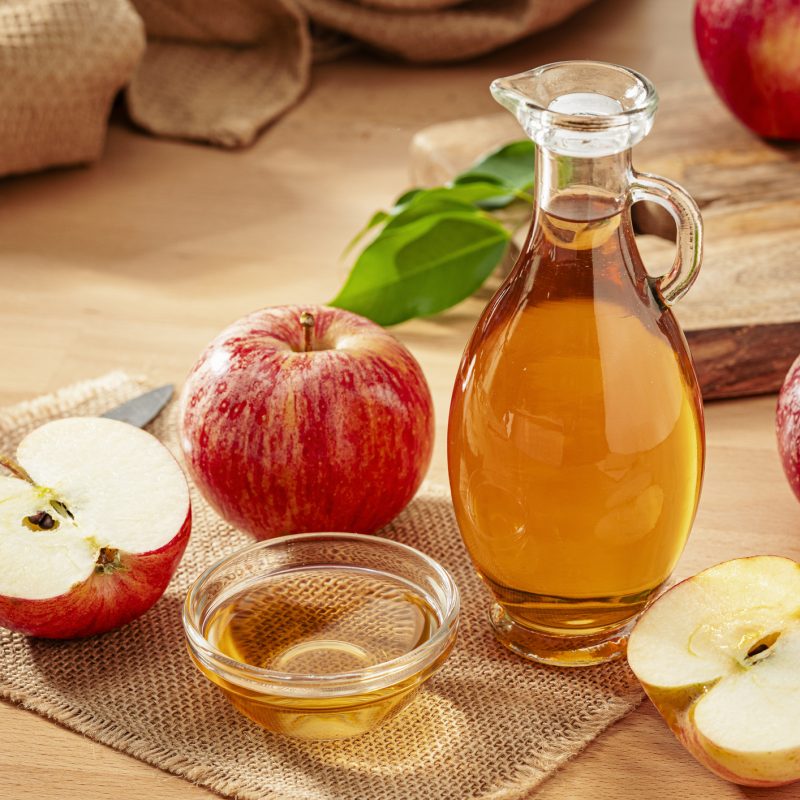
Apple Cider Vinegar (ACV) is a widely used traditional remedy and wellness product. Made by fermenting crushed apples with yeast and sugar, ACV is commonly used in cooking—especially in salad dressings, marinades, and pickling (Benisek, 2024). So, why are athletes and fit pros using it for weight loss, digestion, and other such benefits?
Historically, it’s been valued in traditional medicine for its antimicrobial properties and digestive support. Recent studies suggest it may provide tangible health benefits, such as lowering blood sugar and aiding in weight management (Jafarirad et al., 2023). This CEC covers ACV’s real benefits and risks, its composition, the reasons behind its effectiveness, contraindications, and when to seek medical guidance for either topical or internal use.
What Is Apple Cider Vinegar?
ACV is a vinegar derived from fermented apple juice, known for its strong aroma, tangy taste, and potential health applications (Cleveland Clinic, 2025).
To understand ACV more fully, it’s helpful to look at how it’s made. The process begins by extracting juice from crushed apples. There’s a first fermentation stage where yeast converts the juice’s natural sugars into alcohol. A second fermentation follows, in which bacteria transform the alcohol into acetic acid. This is ACV’s key active compound, responsible for its sour taste and the majority of its health effects (Cleveland Clinic, 2025; Jafarirad et al., 2023).
In addition to acetic acid, ACV contains water, antioxidants, and trace nutrients from apples, including (Benisek, 2024):
-
Calcium
-
Magnesium
-
Potassium
-
Phosphorus
Raw, unfiltered ACV also contains “The Mother”, a cloudy substance made up of beneficial bacteria, proteins, and enzymes. This component is believed to offer added health benefits (Cleveland Clinic, 2025; Jafarirad et al., 2023).
Common Uses of ACV
ACV is versatile. It’s used not only in culinary applications like salad dressings and marinades but also as a natural cleaner and skin treatment. It may support digestion, regulate blood sugar, and aid in weight management (Benisek, 2024; Cleveland Clinic, 2025).
Types of Apple Cider Vinegar
Raw/Unfiltered
This form contains “The Mother” and is unprocessed, retaining probiotics and nutrients. It appears cloudy and may have sediment at the bottom. Brands like Bragg and Dynamic Health offer this type. While beneficial for detox drinks, cooking, and natural remedies, it has a shorter shelf life and a strong taste that some may find off-putting (Benisek, 2024).
Filtered
Filtered ACV is clear and free of sediment due to the removal of The Mother via filtration. Though it has a longer shelf life and milder taste, it lacks many of the probiotics and nutrients present in raw ACV. For this reason, it’s mainly used in food preparation and cleaning (Benisek, 2024).
Pasteurized
Pasteurized ACV is heat-treated to eliminate all bacteria, including beneficial ones. It may be filtered or unfiltered, but it is typically clearer (transparent). It’s ideal for food preservation and safe for people with compromised immune systems. However, it is not typically used for health remedies, as it lacks enzymes and probiotics (Benisek, 2024).
Health Benefits of Apple Cider Vinegar
Emerging research supports several health claims associated with ACV. For example, studies in animals suggest acetic acid can reduce fat storage and improve metabolism. A notable human study involving 175 participants found that those who consumed 1–2 tablespoons of ACV daily experienced modest weight loss and improved triglyceride levels over three months (Harvard Health, 2023).
ACV also promotes digestive health by supporting enzymatic activity. While ACV itself isn’t an enzyme, it creates optimal conditions in the stomach for digestive enzymes like pepsin (protein), amylase (carbohydrates), and lipase (fats) to function efficiently (Urbinati et al., 2021) due to its impact on the pH in the human body.
Other possible benefits include (Harvard Health, 2023; Jafarirad et al., 2023):
-
Improved insulin sensitivity
-
Reduced blood sugar spikes
-
Appetite suppression
-
Potential support for cholesterol and blood pressure levels
ACV also has traditional uses in skincare and household cleaning.
Evidence-Based Claims
Scientific research continues to validate ACV’s (Jafarirad et al., 2023; Mcdonald, 2018):
-
Support for blood sugar regulation
-
Modest impact on weight loss
-
Contribution to digestive enzyme function
-
Possible role in fat metabolism and satiety
Risks and Side Effects
Despite its benefits, ACV can have drawbacks (Mayo Clinic, 2025):
-
Tooth Enamel Erosion: The high acidity can weaken tooth enamel if consumed undiluted.
-
Digestive Discomfort: Some may experience nausea or heartburn, especially with a sensitive stomach.
-
Medication Interactions: Individuals taking insulin, diuretics, or other medications should consult a healthcare provider before regular use.
-
Skin Irritation: When used topically, especially undiluted, ACV can cause burns or irritation.
-
Contraindications: Not recommended for individuals with ulcers or acid reflux unless advised by a healthcare professional.
How to Use ACV Safely
-
Internal Use: Dilute 1–2 tablespoons in 8 ounces of water. Avoid drinking it straight.
-
Topical Use: Always dilute and perform a patch test before applying to larger areas of skin.
-
Best Timing: Take diluted ACV before meals or mix it into salad dressings.
-
Storage: Raw, organic ACV should be stored in a cool, dark place.
Apple Cider Vinegar may offer several health benefits, including improved digestion, weight management, and blood sugar control. However, its use is not without risks, particularly if consumed undiluted or used improperly. Individuals taking certain medications or those with underlying health issues should consult a medical professional before use.
Among the three types of ACV, raw/unfiltered is most commonly used for health-related purposes due to its content of probiotics and enzymes (“The Mother”). While it has a shorter shelf life, it is preferred for natural remedies. Filtered and pasteurized varieties are better suited for culinary and cleaning purposes.
References
Benisek, A. (2024, July 11). Is Apple Cider Vinegar Good for Health? WebMD. Link
Cleveland Clinic. (2025, May 20). What Apple Cider Vinegar Can (and Can’t) Do for You. Link
Jafarirad, S., Elahi, M.R., Mansoori, A., Khanzadeh, A., & Haghighizadeh, M.H. (2023). The improvement effect of apple cider vinegar as a functional food on anthropometric indices, blood glucose and lipid profile in diabetic patients: a randomized controlled clinical trial. Front Clin Diabetes Healthc, 4, 1288786. https://doi.org/10.3389/fcdhc.2023.1288786
Mayo Clinic. (2025, March 4). Drinking apple cider vinegar for weight loss seems far-fetched. Does it work? Link
McDonald, E. (2018, August 24). Debunking the health benefits of apple cider vinegar. University of Chicago Medicine. https://www.uchicagomedicine.org/forefront/health-and-wellness-articles/debunking-the-health-benefits-of-apple-cider-vinegar
Shmerling, R.H. (2023, June 15). Apple cider vinegar for weight loss: Does it really work? Harvard Health. Link
Urbinati, E., Di Nunzio, M., Picone, G., Chiarello, E., Bordoni, A., & Capozzi, F. (2021). The Effect of Balsamic Vinegar Dressing on Protein and Carbohydrate Digestibility is Dependent on the Food Matrix. Foods, 10(2), 411. https://doi.org/10.3390/foods10020411






